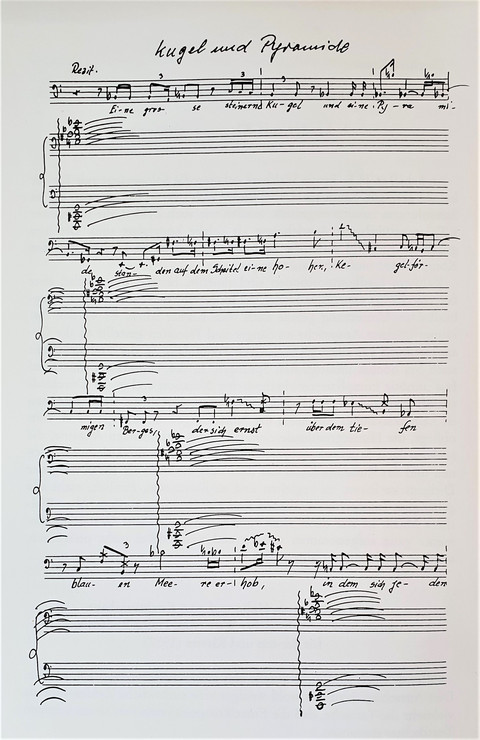Within H.E. Erwin Walther’s oeuvre vocal compositions are quite significant. We can find single tunes with various accompaniments, tune collections and tune cycles, compositions for a big chorus, and oratorios.
Walther’s vocal compositions are bizarre, cheerful, reflective, but almost every time highly expressive songs which mostly derive its power from the piano with respect to the selected text and its sound characteristics. There exist the highest demands on the singer as well as the pianist: on the vocal voice with respect to the noted range, the accuracy, highly unorthodox jumps, the realization of complex rhythms, and the power of enduring most-intensive singing and speaking.
For the pianist a slavish replay of the notation is not expected. His responsibility lies in spanning a background, in forming forward-pitching priorities, in creating abrupt changes of atmosphere, in demonstrating special effects, in leading, attending and illustrating the singing soloist as a superior conductor.
It is only Walther’s music if all these design elements are completely internalized and not pedantically but freehandedly followed.
As much as Walther likes dynamic and expressive surprises, there are also existing stereotypical structures in accompaniment. The composer also likes combining intervals and rhythms, stringing together sounding complexes, accentuating by extreme fortissimo and pianissimo.
One way of expression is traceable in almost every of his song-creations: The speech of the singer as the transgression and cumulation from complex noted towards no longer notable and executable singing.
Eberhard Kraus expressed with respect to the first version of ‘Hiob – eine irdische Passion’: “… the composer’s conceptual idea is really impressively monumental yet in its sound brace subtle and without gigantics, simply truthful and - as one can hear – internally experienced.”
Text following: Eberhard Kraus: H.E. Erwin Walthers Vokalschaffen, in: Bieler, Emmerig, Kraus, Simon: Komponisten in Bayern, Band 36, Tutzing 1998
From: Zwei Lieder für Tenor und Klavier (1953): Die Nachtigall
artists: Joachim Vogt, tenor; Frank Gutschmidt, piano
From: Die Tragödie vom Huhn und vom Kirchturmhahn ... (Bodensiek)
for baritone and piano (1957)
artists: Rudolf Schmelzl, baritone; Eberhard Kraus, piano
From: Sechs Lieder für Sopran und Klavier (1979) (text: T. Emmerig)
artists: Yvonne Friedli, soprano; Frank Gutschmidt, piano
